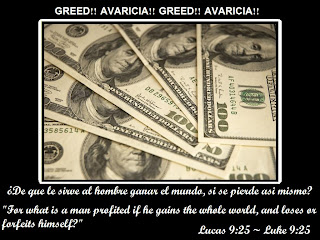 **Mi Opinión, My Opinion**
**Mi Opinión, My Opinion****Cuanta tristeza siento por esas personas que se dejan comprar y que compran cosas malas y chuecas, que no merecen, que no les cuesta, con el cochino y mugroso dinero. Un poema sátiro para todos ellos que incluye mi lastima y la pena que siento por ellos. Ah! Por cierto, El Dinero.. ¡¡NO TODO LO COMPRA!!**
Madre, yo al oro me humillo,
Él es mi amante y mi amado,
Pues de puro enamorado
De contino anda amarillo.
Que pues doblón o sencillo
Hace todo cuanto quiero,
Poderoso Caballero
Es don Dinero.
Nace en las Indias honrado,
Donde el Mundo le acompaña;
Viene a morir en España,
Y es en Génova enterrado.
Y pues quien le trae al lado
Es hermoso, aunque sea fiero,
Poderoso Caballero
Es don Dinero.
Es galán, y es como un oro,
Tiene quebrado el color,
Persona de gran valor,
Tan Cristiano como Moro.
Pues que da y quita el decoro
Y quebranta cualquier fuero,
Poderoso Caballero
Es don Dinero.
Son sus padres principales,
Y es de nobles descendiente,
Porque en las venas de Oriente
Todas las sangres son Reales.
Y pues es quien hace iguales
Al duque y al ganadero,
Poderoso Caballero
Es don Dinero.
Mas ¿a quién no maravilla
Ver en su gloria, sin tasa,
Que es lo menos de su casa
Doña Blanca de Castilla?
Pero pues da al bajo silla
Y al cobarde hace guerrero,
Poderoso Caballero
Es don Dinero.
Sus escudos de Armas nobles
Son siempre tan principales,
Que sin sus Escudos Reales
No hay Escudos de armas dobles.
Y pues a los mismos robles
Da codicia su minero,
Poderoso Caballero
Es don Dinero.
Por importar en los tratos
Y dar tan buenos consejos,
En las Casas de los viejos
Gatos le guardan de gatos.
Y pues él rompe recatos
Y ablanda al juez más severo,
Poderoso Caballero
Es don Dinero.
Y es tanta su majestad
(Aunque son sus duelos hartos),
Que con haberle hecho cuartos,
No pierde su autoridad.
Pero pues da calidad
Al noble y al pordiosero,
Poderoso Caballero
Es don Dinero.
Nunca vi Damas ingratas
A su gusto y afición,
Que a las caras de un doblón
Hacen sus caras baratas.
Y pues las hace bravatas
Desde una bolsa de cuero,
Poderoso Caballero
Es don Dinero.
Más valen en cualquier tierra,
(Mirad si es harto sagaz)
Sus escudos en la paz
Que rodelas en la guerra.
Y pues al pobre le entierra
Y hace proprio al forastero,
Poderoso Caballero
Es don Dinero.
-----------------------------------------------------
**How much sadness I feel for those people who let themselves be bought or buy bad stuff and croocked, stuff they don't deserve, they didn't earn, with the dirty and lowly money. A satiric poem to all of them that includes my pity and the shame I fell for them all. Oh! By the way, MONEY, DOESN'T BUY EVERYTHING!!**
Mother, I to the gold humiliate myself,
it is my lover and my beloved,
for in pure love
continuously remains yellow.
That double or simple
does everything I want,
Powerful Gentleman
Is, Mr. Money.
It was born in the Indias, honorable,
where the world accompanies it;
it comes to die in Spain,
and it's buried in Geneva.
And he who brings it by his side
is beautiful, although he's fierce,
Powerful Gentleman
Is, Mr. Money.
He is gallant, and is like gold,
He has a broken color,
Person of great value,
He’s as Christian as a Moor.
Since it gives and takes decency
And breaks any law,
Powerful Gentleman
Is, Mr. Money.
They are its main parents
and it’s of noble descending,
because in the veins of the East
All the bloods are royalty.
And it is who makes them equals
to the Duke and to the farmer,
Powerful Gentleman
Is, Mr. Money.
And to whom it doesn’t marvel
to see its glory, without limitation,
that is the least in its house
Mrs. Blanca of Castilla?
But it gives to the low one a chair
and to the coward turns into a warrior,
Powerful Gentleman
Is, Mr. Money.
Its shields are noble weapons
They’re always so forward
That without its Royal Shields
There are no Shields of double weapons.
And even to the oaks themselves
Their miner gives them greed,
Powerful Gentleman
Is, Mr. Money.
For having importance in the deals
And for giving such good advices,
In the houses of the elder
Cats keep it from cats.
And it breaks modesty
And softness the severest and most fair judge
Powerful GentlemanIs,
Mr. Money.
And its majesty is so great
(Although its duels are so many),
That with having made quarters,
Doesn’t lose its authority
But because it gives quality
To the noble and the beggar,
Powerful Gentleman
Is, Mr. Money.
I never saw ungrateful ladies
That to its taste and liking,
That facing a doubloon
Make their faces cheap
And then makes them haughty
From a leather bag,
Powerful Gentleman
Is, Mr. Money.
They are worth more in any land
(You watch if it’s very sagacious)
its shields at peace
than its round shields at war.
AND TO THE POOR MAN BURIES
And it turns into proper the stranger,
Powerful Gentleman
Is, Mr. Money.
Shinigami*
~Life Isn't Set In Stone, Things Change~









